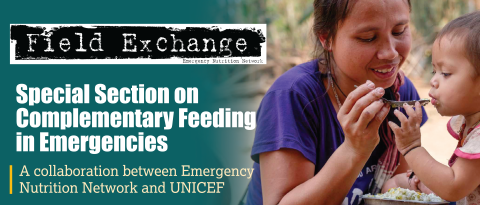Complementary Feeding in Emergencies Special Section
Published:
Global crises are having a severely detrimental impact on the diets of young children, making this featured special section on complementary feeding in fragile and emergency contexts all the more timely. We are delighted to bring you this selection of articles in partnership with UNICEF, who share the latest programming guidance, research and learning obtained from multiple contexts.
- A global perspective on improving the diets of infants and young children
- UNICEF regional perspectives on complementary feeding
- How has COVID-19 impacted nutrition services in Sri Lanka?
- An innovative feeding tool to improve young children’s diets
- Sudan, Nigeria, Myanmar, and Yemen: Lessons from complementary feeding programming in emergencies
- Improving complementary feeding practices through a comprehensive health systems strengthening approach: experiences from Egypt
- Improving the quality of complementary feeding in Rohingya refugee camps in Bangladesh
- Improving complementary feeding through home fortification in Malawi
- Supporting positive young child feeding practices among Venezuelan migrants and refugees living in Brazil
- Cash transfers and health education to address young child diets in Kenya
- Community peer support groups: Improving infant and young child feeding in Pakistan
- Ukraine crisis: Organisational guidance for the feeding of children aged six months to two years
- Conducting situation analysis as a first step to improve young children’s diets: examples from Ethiopia, Tanzania, and Zimbabwe
- State of Palestine: Investing in assessment positively impacted programming for complementary feeding
- A peer-to-peer model to improve maternal, infant and young child feeding in Rwanda
Published
About This Article
Issue:
Article type:
Editorials
Download & Citation
Recommended Citation
Reference this page
Close
. Complementary Feeding in Emergencies Special Section Editorial.
Citation Tools
Download to a citation manager
Close
The below files can be imported into your preferred reference management tool, most tools will allow you to manually import the RIS file. Endnote may required a specific filter file to be used.


